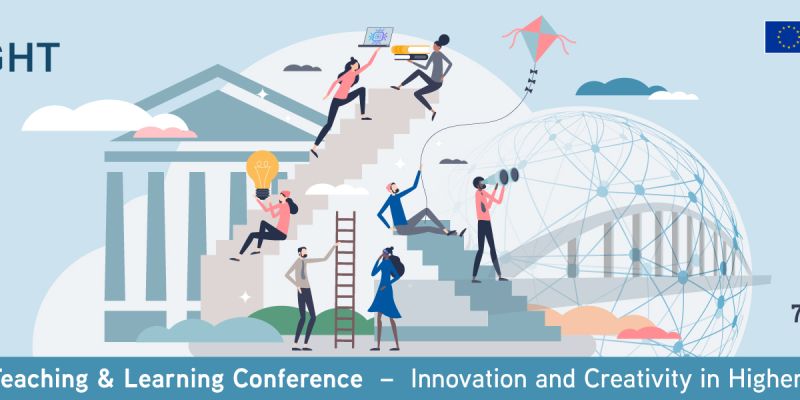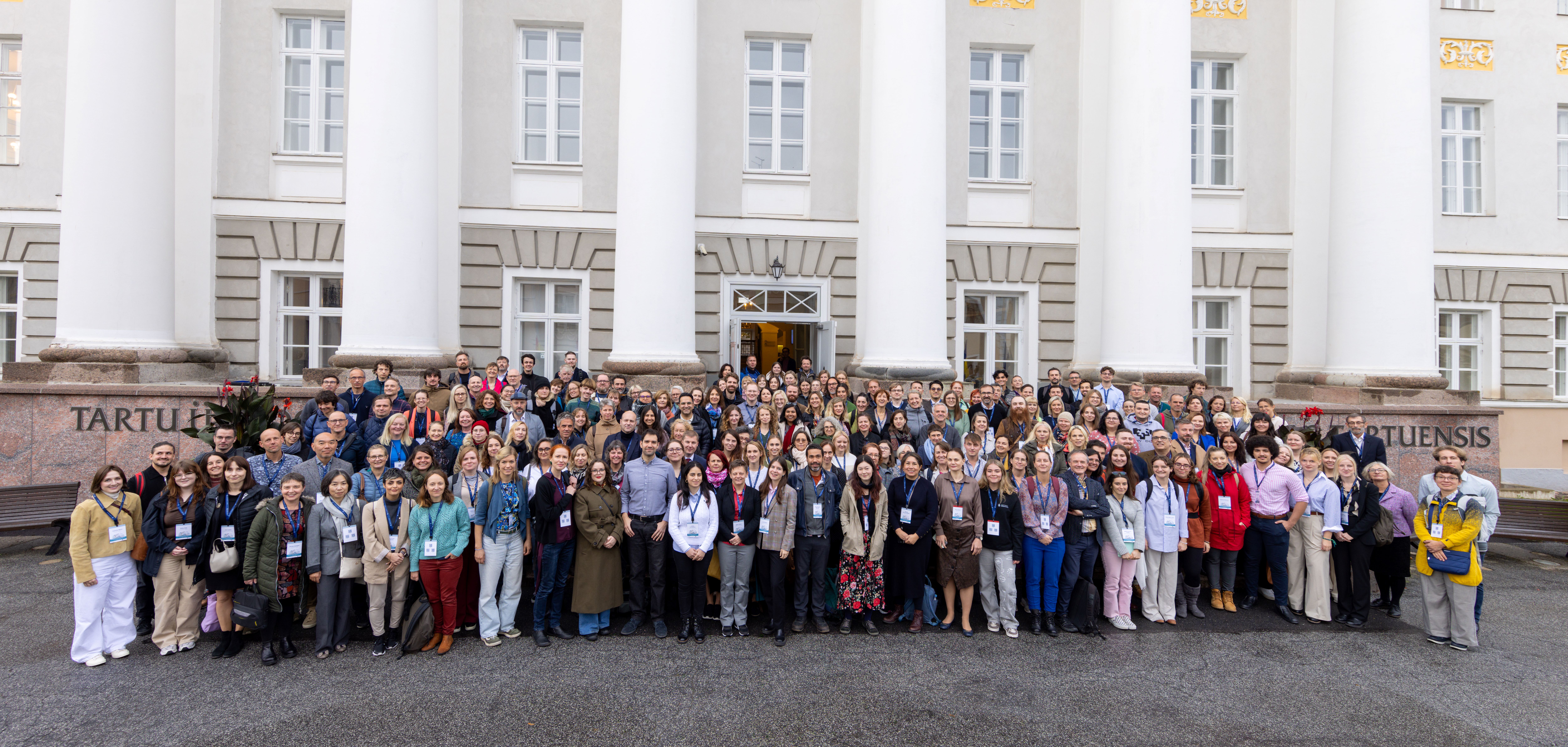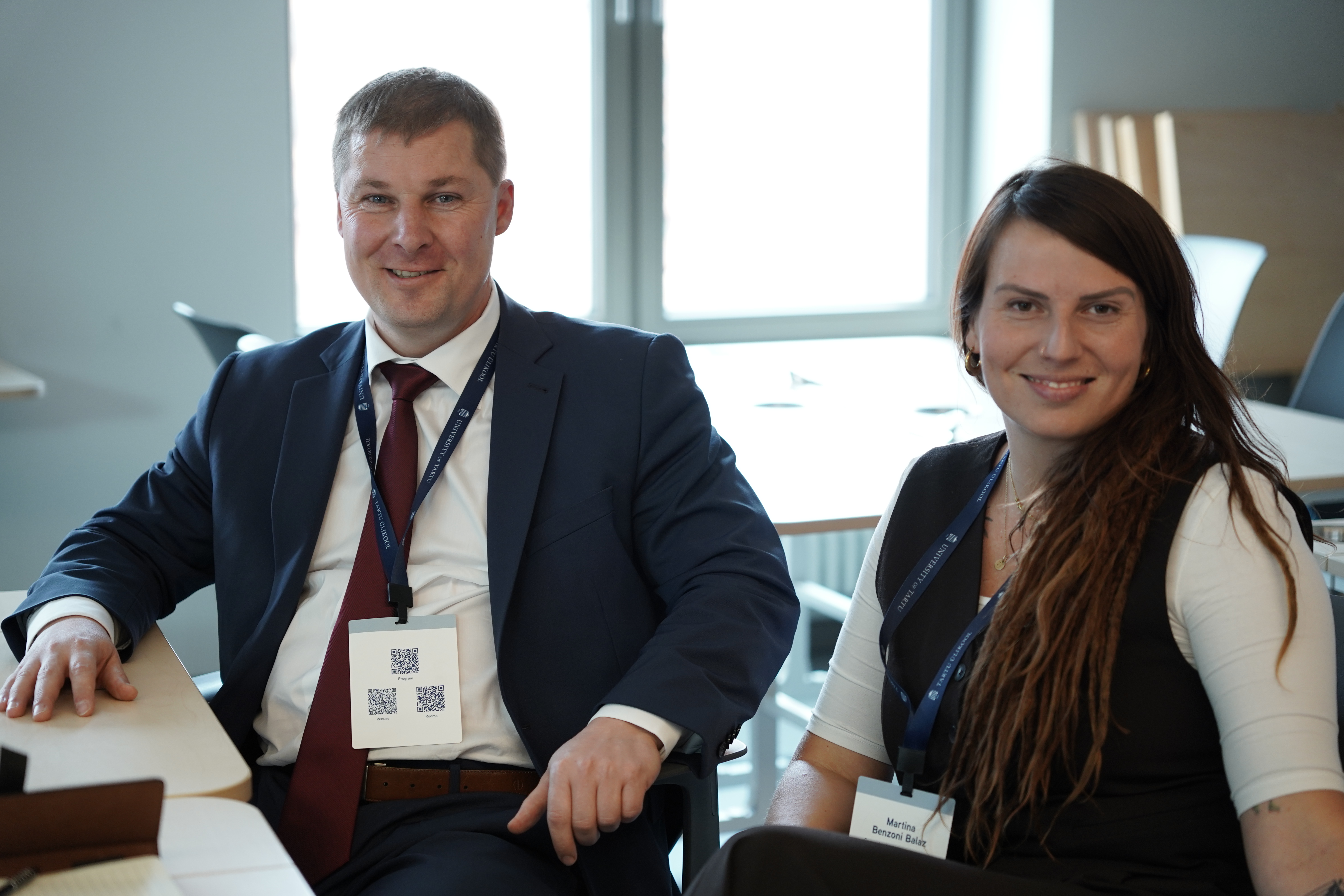NEWS & EVENTS

ENLIGHT Teaching and Learning Conference 2024
The fourth ENLIGHT Teaching and Learning Conference took place at the University of Tartu from 7 to 9 October 2024. The conference theme was Innovation and Creativity in Higher Education.

(Group photo by Andres Tennus)
About
The ENLIGHT Teaching and Learning Conference engages participants in open, international and interdisciplinary discussions. Applicants will contribute via oral presentations, poster presentation sessions, interactive and/or co-creative workshops, or roundtables.
Academics, students, alumni, educational developers, and administrative and support staff from within the ENLIGHT universities can share their experiences and ideas on how it is possible to connect the ENLIGHT educational goals and concepts with teaching and learning practice.
The conference held in Tartu began with a pre-conference on 7 October, when longer workshops were held on topics related to the conference theme. The pre-conference was aimed for a smaller audience of 80 participants. The following days of the conference were dedicated to presentations, shorter workshops, poster presentations, and roundtable discussions. The two keynote speakers were Laura-Maija Hero, Principal Research Scientist at HAMK Edu research unit, who spoke about the design-based approach in teaching and its connection to foster student creativity and innovation, and Jaan Aru, Associate Professor in Computational Neuroscience and Artificial Intelligence at the University of Tartu, who delivered the presentation “Brain learning, creativity and students’ motivation”, in which he discussed how to support creativity and motivation in studying.
The opening ceremony, award ceremony and some of the presentations can be rewatched on ENLIGHT YouTube channel. (will be added soon)
Visit the conference website: ENLIGHT Teaching & Learning Conference 2024 in Tartu
The next teaching and learning conference will take place in 2025 in Uppsala.
Teaching & Learning Award 2024
On 8 October, the Teaching and Learning Award was given to a course which has implemented innovative teaching practices related to the educational goals of ENLIGHT. This year, the award went to the Comenius University Bratislava for their course “Policy making in Slovakia”. It is a practical and challenge-based course transformed by PhD Dr Daniel Klimovský that focuses on critical thinking and has a problem-solving approach. It develops creativity and pro-innovative attitudes among students.
The second place went to the University of Galway for their course “Equity and Sustainability Transitions” and the third place to the University of the Basque Country for the course “Connecting Cultures: Sustainability, Travel, Translation & Migration”.
The winning team (Photo by Zeinäb Mirzojeva)
The nominees were:
The Blended Intensive Programme (BIP) “Connecting Cultures: Sustainability, Travel, Translation & Migration”
Course presented by the University of the Basque Country.
The Blended Intensive Programme (BIP) "Connecting Cultures: Sustainability, Travel, Translation & Migration” provides students a framework for analyzing the complexities of cultural transfer and their implications for sustainability, and leads them, during the on-site week, to co-create solutions to challenges formulated in interaction with sociocultural agents. Its first edition took place from March to May 2024, with five online sessions and one on-site week. It brought to the Faculty of Arts of the University of the Basque Country (UPV/EHU) twenty-five master’s and doctoral students from ENLIGHT (Galway, Uppsala, Bratislava, Ghent, Groningen, Tartu, Basque Country), fifteen international experts and representatives of five cultural institutions and NGOs committed with environmental issues, social inclusion, multilingual diversity, minority languages, or sustainable gastronomy. After three days of workshops, students presented and discussed their proposals with the agents, teaching staff and international experts during a Research seminar on cultural transfer and sustainability. The course was a pilot project of pedagogical innovation for the implementation of Challenge Based Education in Humanities. In view of the success and the significant impact it left on all participants on both academic and personal level, the design of the following editions has been launched.
Equity and Sustainability Transitions
Course "Equity and Sustainability Transitions" presented by the University of Galway.
Sustainability transitions are fundamental changes required in socioeconomic and technical systems (such as energy, food or transport systems) to reduce disruptions and enhance opportunities associated with climate change. Sustainability transitions must be advanced in a way to meet the needs of the present without compromising the ability to meet the needs of the next generation. Equity refers to fairness and justice in the distribution of resources, opportunities and benefits in these processes. Given the need to implement ambitious environmental and climate objectives, this Summer School explores how sustainable transitions can be advanced with equitable distribution of benefits and burdens. This interdisciplinary blended course ambitiously covered such themes for up to 30 post-graduate students and ran in 2023 and 2024. It includes a pre-sessional virtual component and a week of intensive in person teaching in Galway, including a one-day field trip. Students learn from lectures, field work, observation, interdisciplinary group work and class discussions.
Inter- and Transdisciplinary Research Project in Sustainable Development (Research Project and accompanying Seminar)
Course presented by the University of Bern.
The course "Inter- and Transdisciplinary Research Project in Sustainable Development (Research Project and accompanying Seminar)" is a two-semester course in which students autonomously design and carry out productive inter- and transdisciplinary research projects in socially relevant areas of sustainable development. In collaboration with the Centre of Development and Environment, transdisciplinary partners (NGOs, governments, private sector, etc.) provide ideas and topics from which the students initially choose one to work on over the two semesters in groups of four to five. During the introductory phase in the spring semester, the students gain the necessary expertise in the application of methods, project management skills, and the working environment of an interdisciplinary team as well as in the evaluation and public outreach of projects. Throughout the course, they will be mentored by a team of university teachers and individuals from the transdisciplinary partners. Applying their disciplinary and other skills, students carry out the bulk of their research projects over the summer break and present and critically evaluate their work in the autumn term. In this innovative format, they learn how to collaborate with students from other disciplines and stakeholders from both science and practice.
From Autumn 2024 on the module will be an integral part of the brand new Master’s Programme.
Policy Making in Slovakia
Course "Policy making in Slovakia" presented by the Comenius University Bratislava.
This course is taught in the last semester of the three-year bachelor-level study programme at the Department of Political Science, Faculty of Arts, Comenius University in Bratislava. It follows the Public Policy course. Whilst the preceding course is focused on relevant theories, Policy Making in Slovakia has been transformed by Daniel Klimovský and is more focused on practical application. Thanks to close collaboration with the Metropolitan Institute of Bratislava, the course is challengedbased. It focuses on critical thinking and has a problem-solving approach. It develops creativity and pro-innovative attitudes among students. The institute defines the semester assignments and contributes to the monitoring of students' progress as well as to the final evaluation. Teachers assist students with theoretical concepts and the identification of examples of best national and international practice. An emphasis is placed on student responsibility. They work in small groups, collaborate with various stakeholders, and have to develop leadership skills to accomplish their tasks. Thanks to training elements as well as the application of the learning-by-doing method, students improve several important skills and enhance key competences. At the end of the course, students are able to identify problems, analyse them, develop innovative solutions, and prepare policy papers.
Adapting to Climate Change: Ecosystem Services of Urban Green Zones
Course "Adapting to Climate Change: Ecosystem Services of Urban Green Zones" presented by Uppsala University.
This interdisciplinary course explores ecosystem services of urban green areas combining theory and CBE creative practice to investigate the role of urban green in relation to human well-being in climate change mitigation. This May, with 21 students from six ENLIGHT universities and a diverse teacher group, including Uppsala municipality representatives, professional arborists, and iTree modeling toolbox developers, we worked together in BIP format. After two intensive online weeks, we met for onsite activities in Uppsala. We were practicing iTree Eco tool to estimate ecosystem services of trees, we visited Uppsala municipality and completed a tree inventory in two small parks here, with creating and placing tree tags to inform citizens about value of trees. The course has a narrow yet interdisciplinary topic that determines a big variety of professional background of the student group and trains their trans-disciplinary communication skills. Leadership and collaboration in intercultural environment emerges with an intensive online group work, outdoor fieldwork with urban trees in Uppsala, and using innovative teaching formats like public debates. This combination of online and onsite activities with a diverse teachers group on board fosters problem-solving and critical thinking.
International Module Teacher Education: Teaching for Global Citizenship in European classrooms
Course "International Module Teacher Education: Teaching for Global Citizenship in European classrooms" presented by Ghent University.
This course prepares student teachers from all ENLIGHT universities to address two challenges related to global citizenship in their future classroom: (1) dealing with diversity in education and (2) inclusive education. The course introduces the method of challenge-based learning as an engaging, multidisciplinary approach. The course starts with an online pre-programme in which students are introduced to global citizenship in education. Subsequently, students from the same university engage in online group discussions about global citizenship challenges in their local educational system. They work out a group presentation about the educational system in their region and their challenges. In a second phase, students physically come together and follow a 5-day on-site programme with a social and academic focus. During these days, students try to gain insight into the concept of global citizenship through the method of challenge-based education: they participate in group assignments and workshops, attend guest lectures on global citizenship and visit a school that is currently facing (and tackling) issues in the field of global citizenship. In a third phase, students write a short reflection report of about 2 pages, reflecting on what they have learned during their 5-day on-site stay.
Experimentalphysik 1 (Experimental Physics 1)
Course presented by the University of Göttingen.
Experimental Physics 1 is the fundamental introductory physics course for first-semester physics students (major and teacher training). It covers essential concepts and principles of classical mechanics and thermodynamics, providing the foundation for more advanced studies in physics. Lecture demonstration experiments play a central role in illustrating theoretical concepts and deepening students' understanding. These experiments serve to practically demonstrate and explain the physics laws and phenomena discussed in the lectures. The lecture is supplemented by weekly exercises (so-called recitations) and tutorials that reinforce the material and promote the application of learned concepts in problem-solving tasks in small student groups. Typically, students work on problem sets, submit them for correction, and discuss them with tutors. Content-wise, the course begins with the study of point masses (kinematics, dynamics) and increases in complexity: point masses with interactions (e.g., collision), rigidly connected point masses (rigid bodies), relaxing the rigidity condition (solids), many-particle systems (fluids, hydrodynamics), oscillations and waves, as well as the basics of thermodynamics. The goal of the lecture is to provide a fundamental understanding of physics concepts and their mathematical descriptions, to develop analytical skills and problem-solving strategies, and to prepare students for advanced topics in experimental as well as theoretical physics.
ITAP Project
Course "ITAP Project" presented by the University of Bordeaux.
ITAP project: Enhancing the learning of evolutionary anthropology skills by combining student-active teaching with physical and virtual immersion in archeological fieldwork, laboratory practice and dissemination. Training students in evolutionary anthropology requires that we provide them with a thorough knowledge of biological and cultural heritage sites and collections that are frequently inaccessible. Indeed, most archeological sites, fossils, and remains can be visited or handled only rarely and only by specialists with extensive experience. Thanks to the development of 3D imaging techniques, this fragile heritage is now more widely accessible. However, solely relying on virtual learning can negatively impact student engagement and exchanges with instructors, making it an undesirable standalone teaching method. To encourage student engagement and enhance their acquisition of new professional and interdisciplinary skills, we therefore offer Master’s students in archeological sciences at the University of Bordeaux reallife situations in archeological fieldwork (inclusion in scientific teams and participation in excavations), laboratory studies (participation in teams and workshops at the PACEA laboratory), and dissemination of research results (organizing symposia). To enable students to work with resources and train in otherwise inaccessible methods, we complement this physical immersion with virtual access to research activities (immersive videos in the field and in the laboratory), and to archeological, experimental or reference materials (microtomographic and photogrammetric 3D models, surface scans, 2D X-rays, photographs).
The Internet of Things. Empowering Creativity and Innovation in our Students the IoTempower Way
Course presented by the University of Tartu.
Our course, “The Internet of Things,” is an engaging, hands-on course that bridges the virtual and physical to impact positive change. The course can cater to different learning needs with flexible formats: Express (4h) Workshop, Intensive (16h) Workshop, and Full Course (60h guided, 20-40h unsupervised). Starting from the 16h version, we cover core topics of storytelling, basic electronics, IoT architecture, machine-to-machine communication, and exploring open-source IoT integration using Node-RED, all within our fully open-source and in-house developed IoT teaching framework - IoTempower. IoTempower facilitates rapid prototyping, easy integration, system building, and device management. Our course addresses real-world 21st-century challenges by integrating various fields such as computer science, engineering, data analytics, design, storytelling, and interactive arts into our curriculum. We encourage collaboration through group projects and lab tasks, while our teaching approach emphasizes research and exploration for the students. We provide a learning environment that allows controlled failure and refinement to cater to the creative development of the learner. Our diverse student body facilitates intercultural and international learning, international guest speakers from industry and academia, and regular exchanges with other university programs and teachers, including ENLIGHT partners. We employ challenge-based education, where students solve and select real-world IoT problems, enhancing their learning experience.
Critical Tourism Studies and Virtual Township Tour
Course presented by the University of Groningen.
The Critical Tourism Studies course is a Master’s level course that is driven by critical conversations regarding the social, cultural, environmental, health and well-being, economic, and political impacts of global tourism in the 21st century. The course focuses particularly on the impacts of tourism in the Global South and the movement of tourists from the North to the South. The central feature of the course is a Virtual Township Tour, in which the students ‘tour’ a township in South Africa. The tour is guided by a resident and community activist in the
township and is facilitated by himself and a fellow community activist and entrepreneur. Following the tour, the students are given ample opportunity to debrief with the facilitators and ask questions about tourism’s impacts in the township and how the tourists are perceived by local residents. Critically, the tour is focused on the locally-initiated improvements in the
community that include day care centers, youth after-school programming, and housing for low or no income residents. The students are able to learn about the impacts of apartheid from people who lived through it and continue to live in its shadows. Ultimately, the course is focused on learning about how people in the Global South are empowered to make changes for themselves and the students come away feeling inspired by the township residents, where initially they had anticipated feeling pity for them.
Creativity and Innovation
Creativity is the ability to produce new, diverse, and unique ideas. It is the practice of thinking outside of the box. Creativity empowers students to find innovative solutions to complex challenges. While creativity is the ability to produce new and unique ideas, innovation is the implementation of that creativity.
Education strives to prepare students for a world of constant change. Beyond traditional academic knowledge, students must develop essential skills that will equip them to thrive in this dynamic landscape. Students propose innovative solutions to a situation or problem, undertake novel actions and show initiative and resolution capacity. It means students can look at a problem from multiple perspectives — including those others may not see.
Teaching should cater to developing students’ creative and innovative skills by incorporating active learning, challenge-based education, project-based learning, problem-solving, arts-based tasks and critical thinking. Collaboration and communication are crucial, as are considerations for equity to ensure access for all students.
The conference offers an excellent opportunity to share ideas and experiences on how innovation and creativity have been supported in universities and how to do so in the future.
The sub-themes of the conference were:
- Supporting creativity and innovation in education through active learning and engagement
- Designing learning environments that foster creativity and innovation
- GenAI’s impact on creativity
- Society's expectations for a creative university
- Failure or a Creative Idea?
- Challenges in assessing innovation and creativity
Contact
For additional questions and information, please contact:
Social Media official hashtag: #TL24ENLIGHT
